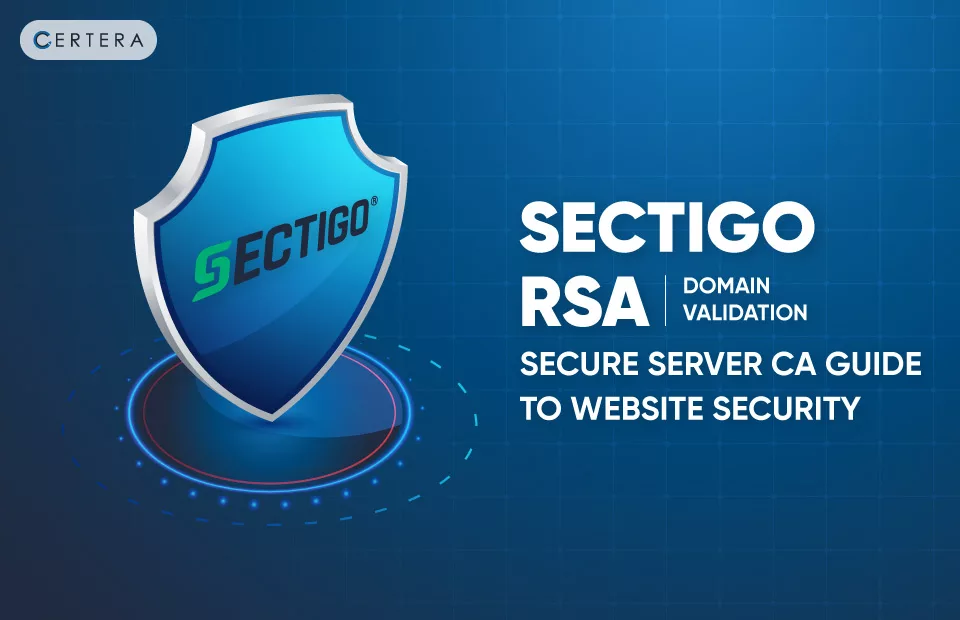Sectigo RSA Domain Validation Secure Server CA for Website Security

In this blog, we have covered Sectigo RSA Domain Validation Certificate, answering all your questions and shedding light on its significance for enhancing website security.
By the end of this article, you’ll clearly understand what this certificate is, how it works, and why it plays a crucial role in safeguarding your online presence. So, let’s begin the journey to keep our websites secure.
Basics of Sectigo RSA Domain Validation Secure Server CA
Sectigo RSA Domain Validation Secure Server CA is a highly trusted digital certificate to ensure safe and secure web browsing experiences. This certificate is crucial in establishing a secure connection between a user’s browser and the web server, safeguarding sensitive information from potential threats.
One of the primary functions of the Sectigo RSA Domain Validation certificate is to encrypt data transmitted between the user’s browser and the web server. Employing robust encryption algorithms ensures that any data exchanged, such as personal information, login credentials, or financial details, remains protected from prying eyes and hackers attempting to intercept it.
Moreover, the certificate also plays a vital role in authenticating the web server’s identity. This validation process ensures that the website being accessed is operated by the entity it claims to be and is not an imposter trying to deceive users.
By verifying the authenticity of the webserver, Sectigo RSA Domain Validation Secure Server CA prevents phishing attacks and ensures users can trust the website they are interacting with.
How a Certificate Authority (CA) Validates a Domain?
The Domain Validation (DV) process is the first step in obtaining an SSL certificate and ensuring the legitimacy of a domain.
Here’s a glimpse into how a Certificate Authority (CA) validates a domain:
CNAME Record Check:
After initiating the SSL activation process, the Certificate Authority begins the validation by checking the CNAME (Canonical Name) record associated with the domain. The CNAME record serves as an alias for the domain and helps direct traffic to the correct location.
Completing Domain Control Validation (DCV):
Once the CA successfully locates the CNAME record, the Domain Control Validation (DCV) process is completed. DCV ensures that the entity requesting the SSL certificate controls the domain.
Issuance of SSL Certificate:
In the case of a Domain Validation SSL Certificate, once the DCV process is successfully verified, the SSL certificate is issued promptly. The certificate is then sent to the email address provided during the SSL activation.
The Domain Validation process is relatively simple and quick, making it an ideal choice for individuals or organizations looking for a basic website encryption and security level.
However, it’s essential to remember that DV certificates offer the least stringent validation and are recommended for non-commercial websites, blogs, and small-scale online ventures.
For higher levels of trust and security, organizations may opt for Extended Validation (EV) or Organization Validation (OV) certificates, which involve more rigorous validation processes to confirm the identity and authenticity of the certificate holder.
These certificates are typically used by businesses, e-commerce platforms, and websites that handle sensitive information.
Understanding Sectigo RSA Domain Validation Secure Server CA
To grasp the significance of Sectigo RSA Domain Validation Secure Server CA, it’s essential to delve into its two fundamental components: Sectigo and RSA.
Sectigo – A Renowned Global Certificate Authority:
Previously known as Comodo until October 2018, Sectigo underwent a transformative change when Francisco Partners acquired Comodo, leading to its rebranding as Sectigo.
Under the new Sectigo CA brand, all Comodo digital certificates and sub-brands, including popular ones like PositiveSSL and InstantSSL, are now offered. Even the certificates issued before the rebranding now fall under the Sectigo CA brand umbrella.
Therefore, in the context of Sectigo RSA Domain Validation Secure Server CA, “Sectigo” refers to the Certificate Authority responsible for issuing the certificate.
RSA – A Trustworthy Hashing Algorithm:
The term “RSA” on an SSL certificate indicates using the RSA hashing algorithm to encrypt the certificate’s signature keys.
The security of the RSA algorithm relies heavily on the keys’ size. In the past, the widely adopted key size was 2040 bits, but since 2021, the minimum key size recommended for RSA encryption is 2048 bits.
As technology progressed, a newer, more efficient algorithm emerged – elliptic curve cryptography or ECC. This alternative algorithm boasts faster performance and lower resource consumption compared to RSA.
Hence, when considering an SSL certificate, it’s advisable to verify whether it supports the ECC algorithm, reflecting the latest advancements in cryptography.
Role of An Intermediate Certificate: A Classification of Sectigo RSA Domain Validation CA
The Sectigo RSA Domain Validation CA certificate is classified as an Intermediate Certificate, not a Sectigo SSL (Root) certificate. As an Intermediate Certificate, it plays a critical role in the SSL certificate issuance process.
An Intermediate Certificate bridges the Root and SSL (Leaf) certificates issued directly to websites. Sectigo refers to these Intermediate Certificates as Issuer CA certificates since they are responsible for issuing each subscriber’s SSL certificates.
The Sectigo SSL (Leaf) certificate is directly issued to a website to validate its identity in the SSL certificate chain of trust. This SSL certificate is signed by the Intermediate Certificate (Issuer CA certificate), and in turn, the Intermediate Certificate is signed by Sectigo’s Trusted Root Certificate.
Using an intermediate root to sign the leaf certificate adds an extra layer of security to the SSL infrastructure. In the event of a compromise of the Root Certificate, the Intermediate Certificates and all SSL (Leaf) Certificates signed by those intermediates would be affected. This situation would lead to a break in the chain of trust, rendering the certificates invalid.
It’s crucial to understand that Intermediate Certificates are cross-signed certificates, while Root Certificates are self-signed and occupy the top position in the chain of trust model.
Maintaining the integrity and security of the Root Certificate is paramount, as any breach could have severe consequences for the entire SSL infrastructure and the websites relying on these certificates for secure communication.
Regular audits and robust security measures are implemented to safeguard Root Certificates and ensure the trustworthiness of SSL certificates issued by the Certificate Authority.
What Does Domain Validation in Sectigo Mean?
SSL certificates’ authentication type is one crucial aspect that sets them apart. Among the recognized categories are:
“Domain Validation” in Sectigo RSA Domain Validation Secure Server CA indicates that the certificate uses domain validation (DV).
This type of validation holds immense popularity due to three key reasons:
Need a Seamless Certification Process?
With domain validation, the Certificate Authority (CA) verifies whether the entity requesting the certificate is the legitimate owner of the domain name. This straightforward process ensures quick issuance without extensive validation requirements.
Need an Instant Certification Process?
The validation procedure is relatively simple and automated, expediting the issuance of the certificate within a short span, often within an hour or so. This rapid turnaround time is advantageous for organizations seeking immediate website security.
Need an Affordable Certification Process?
DV certificates offer a lower level of validation, requiring minimal human intervention from the CA compared to other types like OV and EV. This streamlined approach results in more cost-effective pricing, making DV certificates popular for many website owners.
However, it’s essential to note that OV and EV authentication certificates are tailored for larger organizations, businesses, or industries that demand higher trust and security. While these certificates are more expensive than DV certificates, they provide an elevated level of assurance, making them the preferred option for entities prioritizing stringent security measures.
Best Way to Purchase Sectigo RSA Domain Validation Secure Server CA Certificate:
To download the Sectigo RSA Domain Validation Secure Server CA Certificate, you have several reliable sources to choose from:
- Download Sectigo RSA Domain Validation Secure Server Intermediate CA.
- Install USERTrust RSA Root xSigned using Cross Signed AAA CA
- Alternatively, you can download the Intermediate + Cross Signed Sectigo RSA DV Bundle for convenience.
Wrap up
Domain Validation in Sectigo RSA Domain Validation Secure Server CA signifies domain validation, an expedited and cost-effective method to obtain SSL certificates.
While DV certificates are suitable for many use cases, OV and EV certificates cater to organizations seeking heightened trust and security for their online presence.
The right choice of SSL certificate depends on individual requirements and priorities, ensuring a secure and trustworthy environment for website visitors.
